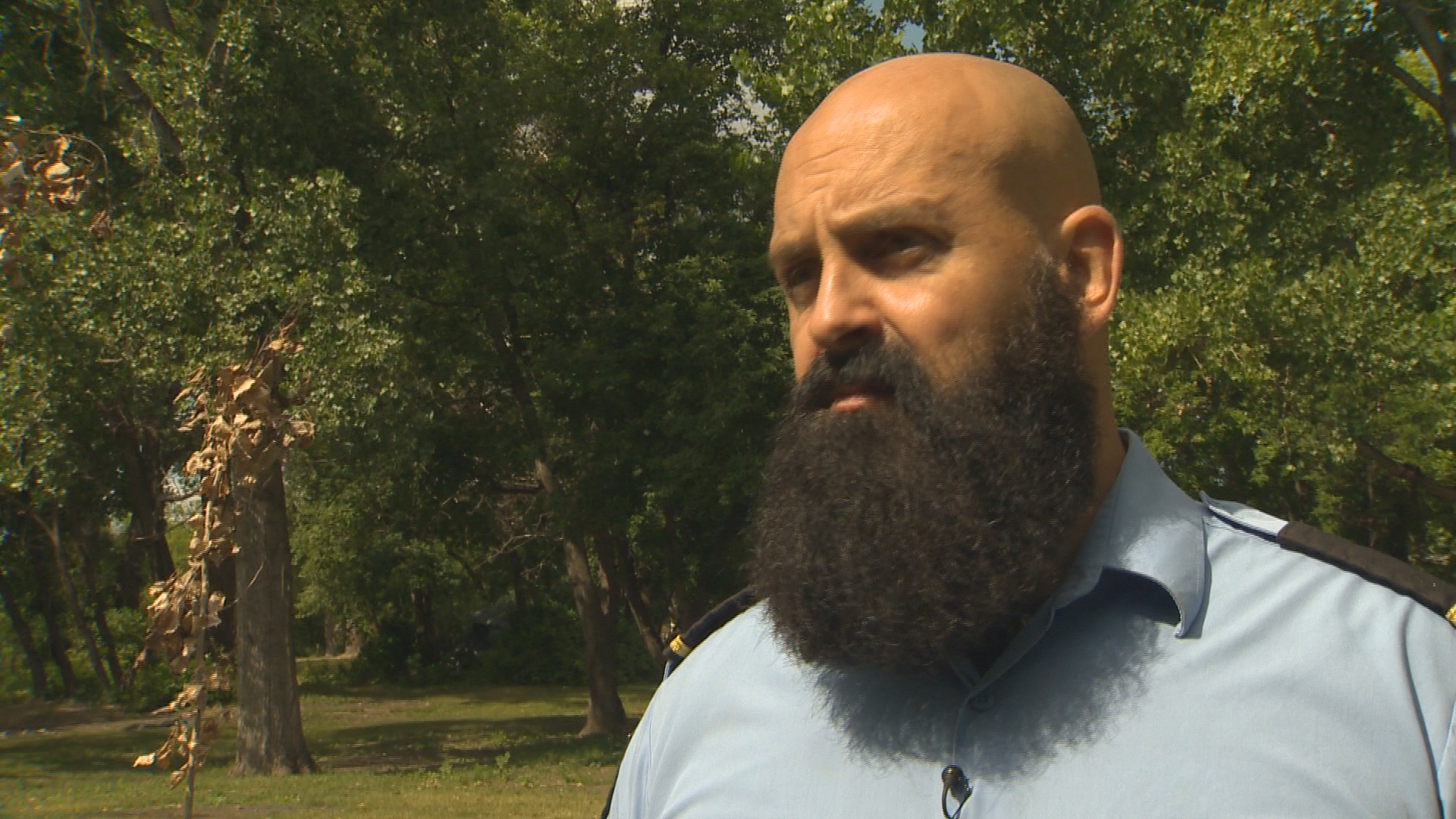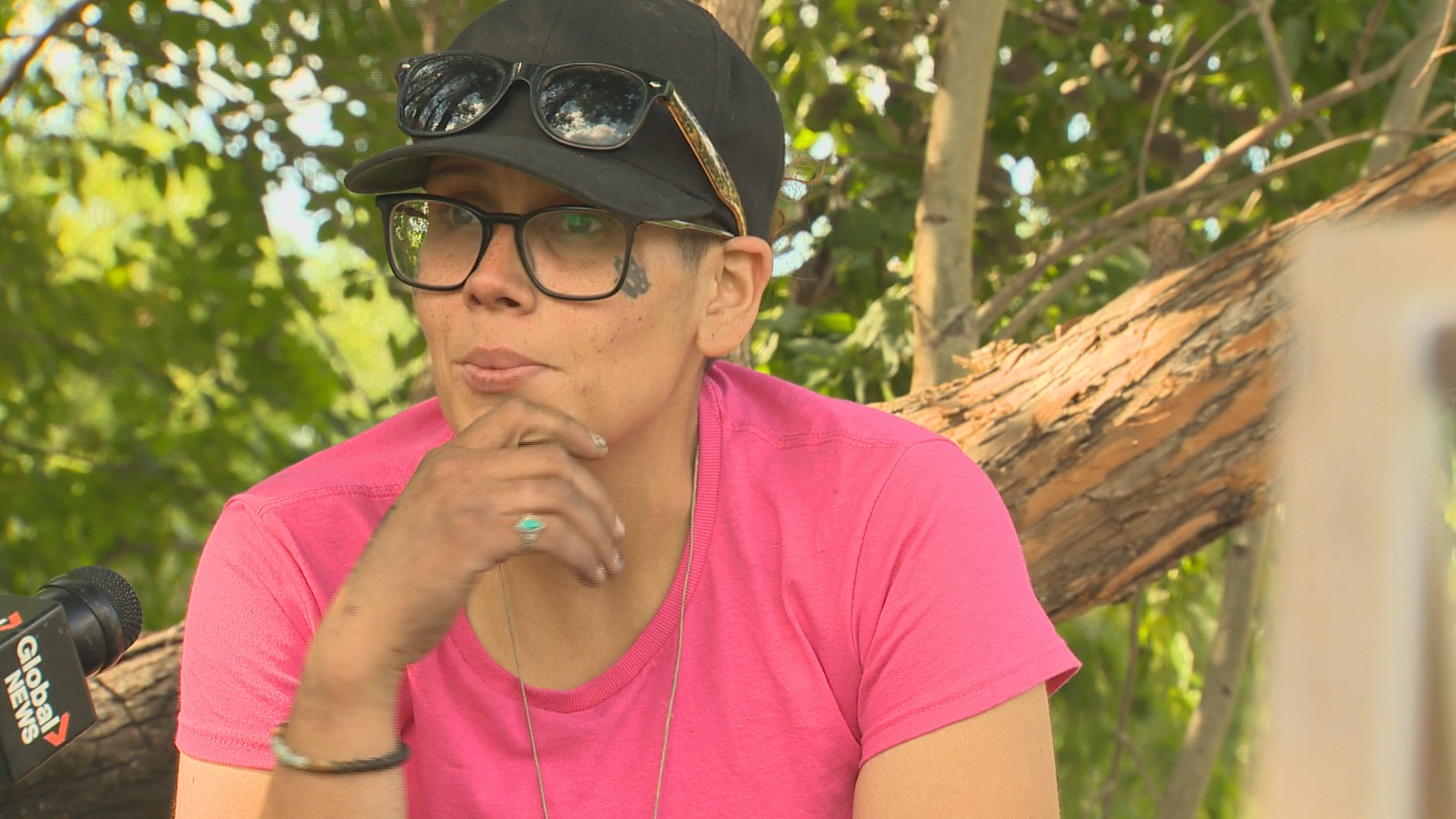From the bitter chill of winter to the blazing Prairie sun, Steven Antle has become a familiar face around encampments.

As the Winnipeg Fire Paramedic Service’s (WFPS) sole community liaison dedicated to them, he drops in with a carbon monoxide detector and naloxone kits to provide safety information.
“Every human being has intrinsic worth, and we work hard towards making sure that everyone knows … that their worth is infinite,” Antle said last week.
He’s held the position for nearly a year and still regularly meets people who are newly experiencing homelessness.
“Young folks aging out of being in care. Folks that the cost of living just became too much,” Antle said.
In January, WFPS gave Global News a glimpse into the challenges that people living in encampments face during the city’s harsh winter. Last week, they shared how those difficulties are evolving mid-summer, for both those experiencing homelessness and the front-line workers trying to keep them safe.
Antle approaches a Point Douglas encampment, greeting a group gathered outside a tent nestled along a tree line.
“Kashis, how’s it going?” he calls out.
“How’s it going?” she answers, giving him a hug. “It’s good to see you, too.”
Marissa Kipling, who goes by Kashis, finds community, freedom and peace by the riverside.
“We have each other’s back, unlike the system, like the system is, is harsh,” the 29-year-old told Global News.
The born and raised Winnipegger, with ties to Peguis and Sandy Bay Ojibway First Nation, fell on hard times after getting caught up in drugs in Regina, she said.
Far from close family and friends, Kipling lost her home, then returned to Winnipeg, where she’s since been living in Point Douglas encampments for the last three years.
“Just getting connected with all the people that I know out here using, it’s kind of hard to get out of that lifestyle and the people and the friends and everything. It’s like, you become part of a different type of family who accept you for your flaws.”
Kipling avoids downtown shelters and struggled to complete the detox component of her addictions treatment due to withdrawal, she said.
She couldn’t put her finger on any solutions that would help her most.
“I’m shy, as it is, to ask for help,” she said. “I never thought about me. I always thought about everybody else.”
Kipling applies carpentry skills she picked up in the public school system to help others maintain their make-shift homes, she continued.
She’s open to finding a place but worries about the bureaucracy that could land her right back to where she finds herself now.
“There’s a bit of me that wants to change and get into a place, but it’s just the fact of having the worries of, say, if I don’t get my health card copied by like EIA (Employment Income Assistance) or something, then they’ll hold back the assistance or the rent.”
“If you don’t pay your rent … you’re getting kicked out, or if you don’t do this, then we’re going to hold your assistance back, or, you know what I mean? There’s not like something hanging over your head where you’re like, I have to jump through the hoops.”
- Canada’s dental plan has officially kicked in. Who is eligible?
- Mandatory breath samples now required in every Toronto-area traffic stop: OPP
- Tories grill Liberals in question period about minister’s ties to lobbyist, PPE company
- N.S. mother ‘in shock’ after enduring 17-hour hospital wait with sick baby
It’s a stable life that feels out of reach — a gap Antle said he hopes he can help close.
But as he waits for enough community-centered housing and units with wraparound supports to take shape, Antle said he sees the cycle of homelessness repeat itself and spread, as Winnipeg attracts precariously housed people from across the country, especially during the summer.
“Winnipeg is kind of getting known as a place, as a good place to be homeless, a place where they’re going to be supported,” Antle said.
It’s something WFPS Deputy Chief Scott Wilkinson hears from other jurisdictions as well and suspects the city’s green spaces may be an appealing factor.
“People are moving not only seasonally but between centres,” Wilkinson said.
He fears encampments could spill onto sidewalks like in Vancouver.
“Most of our encampments have been in … parks, forested areas on the riverbank, but we do see the occasional one moving in and around buildings,” he said.
“We’re very tightly monitoring those because when they start setting up against buildings or around those areas, there’s a much higher risk of threat to the public from fire.”
Environmental concerns like garbage along with fires across Winnipeg’s approximately 70 encampments this time of year continue to keep first responders tied up, Wilkinson said.
Demands on WFPS expected to surge without more services: deputy chief
In February, the province announced its homelessness strategy, which included annualized funding for 700 new social housing units this year — 300 newly constructed ones and 400 through a rent supplement program using existing units.
On Tuesday, Families Minister Rochelle Squires committed another $25 million for more initiatives to combat homelessness.
Part of the money will help keep shelters in Brandon, The Pas, Thompson and Winnipeg open 24-7 for six months during the winter starting October 1, including the Brandon Neighbourhood Renewal Corporation’s Blue Door Project, Main Street Project and Siloam Mission.
As well, funding is being allocated to further develop Manitoba’s 400 rent-supplement units along with “Housing First teams” to ensure new tenants can access case management and clinical support. Call for expressions of interested were released on June 30 looking for both property owners and non-profit organizations, respectively.
Squires also committed $13 of the $25 million for 212 units to help the province meet its target of 300 newly constructed units announced earlier this year, for which it’s issued a negotiated request for proposals.
“I’m hoping to get this done this year,” Squires said Tuesday. “We’re really wanting to move forward rapidly throughout the fall on this project.”
Last week, Wilkinson applauded Manitoba’s commitments to housing for people experiencing homelessness but said it would take time to complete.
“As important as housing is an expansion of mental health and substance abuse supports,” he continued.
He expects the demands on WFPS to further surge without more services — along with the need for Antle’s outreach.
“It’s getting to the point where it’s difficult to manage all by myself, so I can definitely see this becoming a team,” Antle said.
Until then, Antle hopes a conversation, handshake or hug will make a difference.







Comments